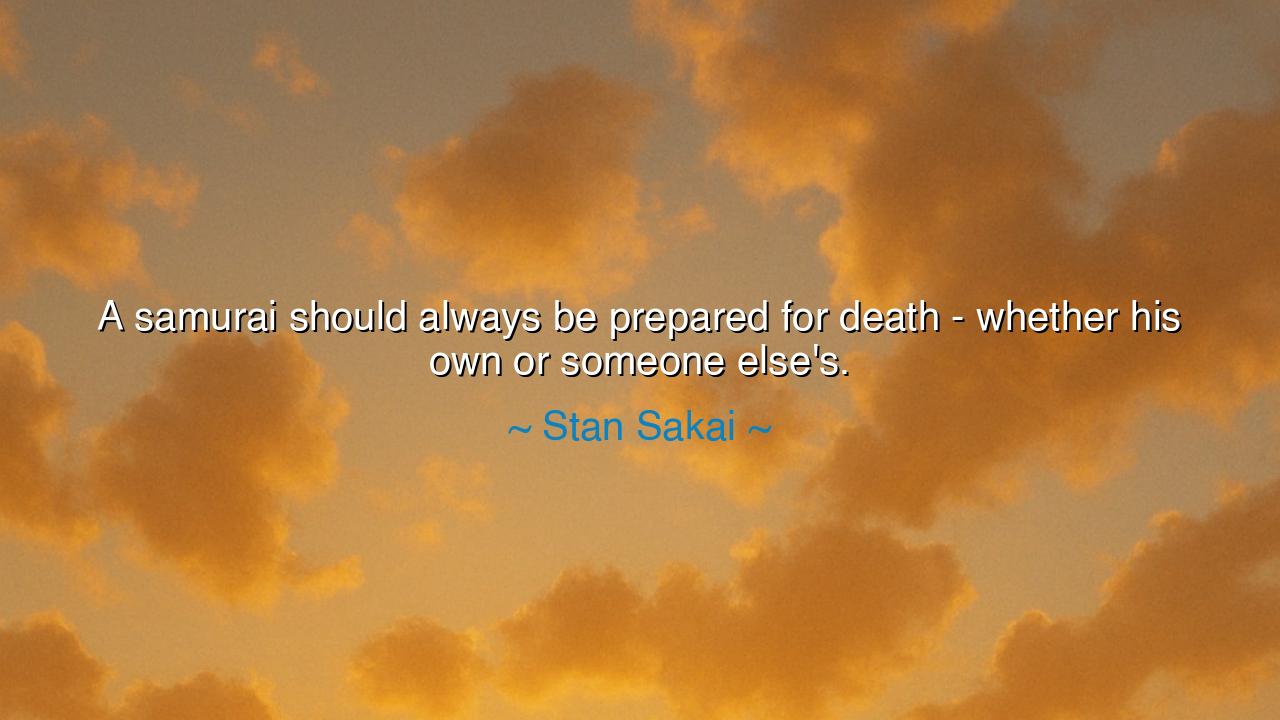
A samurai should always be prepared for death - whether his own






“A samurai should always be prepared for death—whether his own or someone else’s.” Thus wrote Stan Sakai, the creator of Usagi Yojimbo, a storyteller who drew upon the ancient code of Bushidō, the “Way of the Warrior.” In these few words lies not a call to violence, but a meditation on life, duty, and acceptance. To be prepared for death is not merely to steel oneself against fear—it is to live with clarity, to act with honor, and to walk without hesitation along the path that fate lays before you. The samurai, who lived and died by this creed, understood that death is not the enemy of life, but its mirror. Only by facing death without denial could one truly live without cowardice or regret.
In the age of the samurai, Japan was a land where life hung by the thinnest of threads—fragile as cherry blossoms, beautiful in their brevity. The warrior’s life was one of constant vigilance, not only in battle but in spirit. To the samurai, death was not a distant shadow; it was an ever-present companion, walking silently beside him in every sunrise and every duel. To fear it was to lose focus; to ignore it was to lose discipline. But to accept it—to be ready for it—was to attain the calm of true mastery. This is what Sakai’s words evoke: that the prepared heart is unshaken by loss, steady in purpose, and at peace even amid chaos.
The wisdom of this teaching finds its roots in the ancient Hagakure, the Book of the Samurai, where it is written: “The Way of the Samurai is found in death.” But this was never meant as despair. Rather, it was an exhortation to live so purely, so righteously, that when death comes, one meets it without shame. In every stroke of the sword, in every act of service, the warrior rehearses his final moment—so that when it arrives, he may greet it with dignity. To be prepared for death, then, is not to crave it, but to walk beside it as a friend, knowing that one’s actions have been guided by honor.
Consider the story of Miyamoto Musashi, the undefeated swordsman and philosopher who lived by the discipline of Bushidō. From youth, he fought countless duels, often outnumbered, yet he never wavered. But Musashi’s greatness lay not only in his skill, but in his serenity. Before every battle, he accepted the possibility of his own death, and in doing so, he fought without fear. When, at the end of his life, he laid down his sword and retired to a cave to write The Book of Five Rings, he faced mortality as he had faced every opponent—with calm readiness. His last act was not resistance, but acceptance—a final gesture of peace from one who had mastered the art of living and dying as one.
Sakai’s quote carries not only the echo of Bushidō, but a timeless truth that transcends swords and armor. In the modern world, we no longer wield blades, but our battles remain—battles of conscience, duty, loss, and love. To be prepared for death in our age means to accept the impermanence of all things: relationships, achievements, even our own bodies. When we accept that all things must pass, we free ourselves from clinging and fear. The samurai’s calm is born not from cruelty, but from clarity. He cherishes life precisely because he knows it can be lost in an instant.
But the quote speaks also of another kind of readiness—the readiness to witness another’s death. The samurai must not only face his own mortality, but also the pain of losing others. This, too, is part of the warrior’s path. For compassion and courage are not opposites—they are twin blades. To grieve, yet still act; to honor the fallen by carrying forward their legacy; to meet loss not with despair but with resolve—these are the marks of a true warrior. Sakai’s words remind us that to live as a samurai is to be both strong and tender, to carry death in one hand and compassion in the other.
Therefore, my child, take this lesson into your own heart: Live as if you were already prepared to die. Do not waste your days in fear of endings, for every ending is but a doorway to renewal. Face your duties with courage, your losses with grace, and your destiny with open eyes. Let your actions each day be worthy of your final breath. For when you are prepared for death—when you accept its inevitability—you no longer live in its shadow. You live fully, fiercely, freely. This is the way of the warrior, the way of the wise: to hold life and death in balance, and to meet both with unwavering peace.






AAdministratorAdministrator
Welcome, honored guests. Please leave a comment, we will respond soon